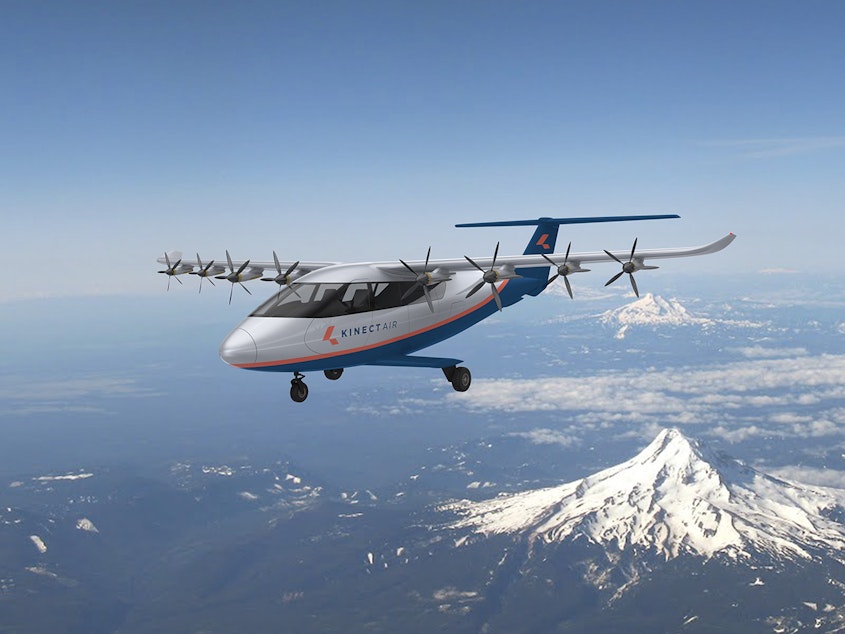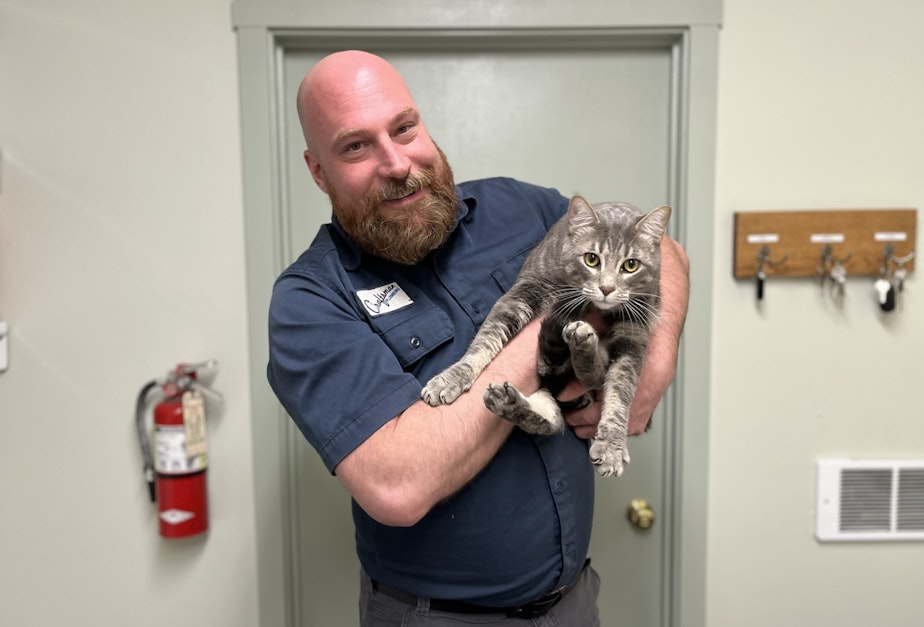Would you rideshare in the sky? Today So Far

- Seattle's Cinerama is coming back!
- NW startup offers local flights across region's small airports, similar to a rideshare in the air.
- Is online grocery shopping creepy or convenient?
This post originally appeared in KUOW's Today So Far newsletter for May 12, 2023.
Seattle's Cinerama is coming back!
News broke late last night that the Seattle International Film Festival has worked out a deal to take over the historic movie theater. You may recall there was some drama around Cinerama in 2020, when the theater abruptly closed. At the time, the message was that it would reopen later that year. With the pandemic emerging, however, that never happened. It has remained closed ever since.
Now, SIFF is stepping up to keep the projector lights on. Terms of the sale between SIFF and Paul G. Allen's estate are unknown. The answer to the most important question we all have is also unknown: Will there be chocolate popcorn when the theater reopens?
Read more here.
In the small town of North Bend on the Oregon Coast, there is a watering hole called The Liberty Pub. At one end of its long bar is a small plaque, so small, many don't notice it. Patrons who do, however, are informed that "Harrison Ford sat here April 5, 2014."
The bar even saved the label from a bottle of scotch they opened for Han Solo, er, I mean Ford. The story, as the pub's owner related it to me, is that Ford was taking a helicopter trip up the West Coast with a friend. It was a small helicopter, and North Bend has a small airport. When the two travelers landed to refuel, they asked where the local pub was for some food and they were directed to The Liberty Pub. The rest is local history.
Jack Ryan's trip wouldn't have happened without North Bend's small airport. There are many like it across the Northwest, in Renton, Olympia, Hillsboro, and beyond. And they all have small airplanes jumping across the region, avoiding freeway traffic, or ferry and train delays. That got folks over at KinectAir thinking. The Portland-based startup is now aiming to reinvent air travel the same way Uber/Lyft changed the taxi industry. Would you book a small, charter airplane to take short trips across the region? KinectAir is betting that you will. If so, you could be like Indiana Jones ... ah, sorry, I mean Harrison Ford, taking a quick jaunt across the region.
When you think about it, companies like Uber and Lyft didn't reinvent the classic taxi. They just had better tech, which completely changed the industry. That's sort of what KinectAir wants to do — connect potential passengers with small airplanes going on trips around the Northwest. The average person likely doesn't know much about charter airplanes, or can sleuth out how to book one like a traveling Rick Deckard. The startup hopes that by putting all these charter planes in one app, travelers will click and fly.
Such trips used to be part of larger airlines' offerings, such as flights from Portland to Bend or Kalispell, Montana. That's not as common today. But the region's smaller airports still have small, propeller-driven four- or eight-passenger planes that can get you where you need to go, just like Bob Falfa traveling up the coast.
In this case, it's more like an air Uber. This person, and that person, and perhaps Dr. Richard Kimble use the KinectAir app to buy a seat on a small airplane, and just like that, they can hop from Seattle to Bend. The company is new, so the pricing for this small service is still hefty for many travelers. It's not like you're gonna be paying so much that you'll be sitting next to President James Marshall, but it's more than what you could find flying out of Sea-Tac.
There's a lot more to this story, such as the potential for small, electric airplanes to make local air travel a lot easier and cheaper. Northwest News Network's Tom Banse has the full story here.
Speaking of useful apps, the latest story in the "State of the Cart" series explores the idea of online grocery shopping, and how comfortable we are with these apps knowing what we like to buy.
Is that creepy or convenient? I would say that it's both, but in this case, I personally care more about the convenience. Not everybody feels this way, but I'm OK with a grocery store knowing that I like pita bread, CB's Nuts, and chipotle Bitchin' Sauce.
Penny Maibie likely agrees with me on this point. She started online grocery shopping when the pandemic hit. It's something she's sticking to even though the pandemic has eased up. Also, she knows that the store keeps an eye on what she is buying.
“They have my habits nailed down,” Maibie said. “They know what I buy and how frequently I buy it. And then they offer me discounts on those things. It’s almost a little creepy.”
Sure, creepy, but also, what a deal! If a grocery store wants to know about my affinity for oats and Secret Aardvark hot sauce in exchange for giving me lower pricing, so be it. This is called "personalized pricing" in the online shopping world, and it's a big tactic for grocery stores. It relies on collecting data, and that is where many customers may not be so comfortable with it. KUOW's Ruby de Luna has the full story on this corner of the grocery industry here.
Now, when I'm talking with Nina, with my phone in my pocket, and I mention that I should look into buying something as random as a speaker amp, and then I suddenly start getting online ads for stereo amps, guitar amps, etc. — that's creepy.
The Friday Five: News you may have missed this week, and other cool stuff on KUOW.org
- No more blinking lights at night, Washington wind turbines to go dark
- Should we think of gun violence as a 'disease'? These epidemiologists do
- 5 things to know about a major new Pew poll of Asians in the U.S.
- Linguist hears your complaints about colloquial English: Words In Review
- Seattle’s Chinatown-International District designated 'endangered historic place.' Will that help the neighborhood?
AS SEEN ON KUOW

Dusty Hoerler with one of the Craftsman Plumbing shop cats. Seattle’s population has grown, and the scarcity of land has led to more big-box stores and more self-storage facilities on industrial land. Now, there’s an effort to preserve that industrial land for industry, whether it’s brewing beer or building ships. (Joshua McNichols / KUOW)
DID YOU KNOW?
This is a bit random, but I came across this online ranking (aka "clickbait") of "trashy beers" and I'm a bit offended.
This one comes from Workshopedia, a tool review website. It basically looked at Google search data for the 36 most popular beers in the USA, and came up with a state-by-state ranking. For Washington, our trashy beer is Rainier. For our Northwest neighbors, Idaho is Keystone Light, and Oregon is Keystone. Oregon surprises me. I would have expected that state to favor PBR. Instead, PBR is Montana's beer.
Here's where I'm hung up — trashy?! Rainier is not trashy. Cheap, yes. Basic, yellow, light beer — sure. A refreshing Northwest brew fit for Sheriff Longmire, Twilight werewolves, and Mount Baker black bears — you betcha!
But not trashy. Bud is trashy. Coors is trashy. Rainier is canned Northwest wit, produced by swamp frogs, tested on local wild running bottles, and carefully delivered via small motorcycles. Ain't nothing trashy about it!
ALSO ON OUR MINDS

Companies are shedding office space — and it may be killing small businesses
Remote work — long assumed to be a temporary phase of the pandemic for many white-collar workers — is dragging on with no real end in sight. Nearly 20% of office space across the U.S. is sitting empty, a milestone that exceeds the vacancy rate following the 2008 financial crisis. Analysts worry that this trend could set off a domino effect: If companies continue to give up their office leases, their landlords may not be able to keep up with mortgage payments, increasing the risk of defaults and foreclosures.

